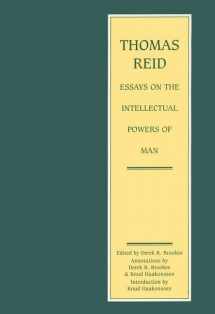
Thomas Reid - Essays on the Intellectual Powers of Man: A Critical Edition (Edinburgh Edition of Thomas Reid)
ISBN-13:
9780748611898
ISBN-10:
0748611894
Author:
THOMAS REID, Derek R Brookes PH.D., Emeritus Professor Knud Haakonssen
Publication date:
2002
Publisher:
Edinburgh University Press
Format:
Hardcover
651 pages
Category:
Epistemology
,
Philosophy
FREE US shipping
Book details
ISBN-13:
9780748611898
ISBN-10:
0748611894
Author:
THOMAS REID, Derek R Brookes PH.D., Emeritus Professor Knud Haakonssen
Publication date:
2002
Publisher:
Edinburgh University Press
Format:
Hardcover
651 pages
Category:
Epistemology
,
Philosophy
Summary
Thomas Reid - Essays on the Intellectual Powers of Man: A Critical Edition (Edinburgh Edition of Thomas Reid) (ISBN-13: 9780748611898 and ISBN-10: 0748611894), written by authors
THOMAS REID, Derek R Brookes PH.D., Emeritus Professor Knud Haakonssen, was published by Edinburgh University Press in 2002.
With an overall rating of 4.4 stars, it's a notable title among other
Epistemology
(Philosophy) books. You can easily purchase or rent Thomas Reid - Essays on the Intellectual Powers of Man: A Critical Edition (Edinburgh Edition of Thomas Reid) (Hardcover) from BooksRun,
along with many other new and used
Epistemology
books
and textbooks.
And, if you're looking to sell your copy, our current buyback offer is $0.36.
Description
This is Thomas Reid's greatest work. It covers far more philosophical ground than the earlier, more popular Inquiry. The Intellectual Powers and its companion volume, Essays on the Active Powers of Man, constitute the fullest, most original presentation of the philosophy of Common Sense. In the process, Reid provides acutely critical discussions of an impressive array of thinkers but especially of David Hume. In Reid's eyes, Hume had driven a deep tendency in modern philosophy to its ultimate conclusions by creating a phantom-world of so-called 'ideas' that sprang from objects of observation; the self was a conglomeration of perceived ideas; and the will as the source of action was nothing but the balance of passionate impulses. Reid's Common Sense philosophy answers these problems by suggesting that sceptics, such as Hume, unavoidably affirm what they purport to deny, namely the existence of a stable external world, of other minds, of the continuity of their own minds, and of their own and other people's ability to ascribe and accept responsibility for actions. We can understand all of this by proper empirical observation and philosophical analysis of the activity of the mind. Reid's major positive contribution to philosophy is a detailed account of the various innate powers of the mind. While particularly influential in the first half of the nineteenth century, Reid's work has retained a significant role in philosophy, not least in recent years. At the same time, his role in the Scottish Enlightenment is becoming much better understood. This is the only properly established text. It is accompanied by manuscript lectures on the nature and immortality of the soul, as well as helpful editorial annotation and introduction, making it useful to a wide variety of readers. Features * Accurate, reliable and critically established text * The Introduction explains the work's genesis and its place in Reid's system * Annotations provide an understanding of Reid's context * An Appendix contains manuscript material covering an important topic not represented in the hitherto published work


We would LOVE it if you could help us and other readers by reviewing the book
Book review

Congratulations! We have received your book review.
{user}
{createdAt}
by {truncated_author}


